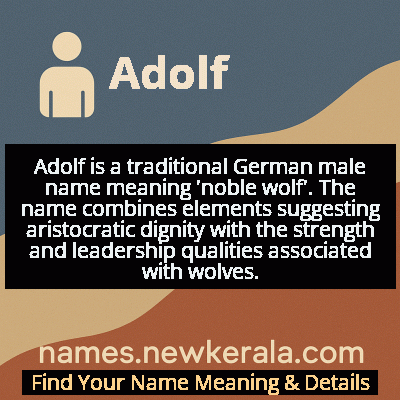Adolf Name Meaning & Details
Origin, Popularity, Numerology Analysis & Name Meaning of Adolf
Discover the origin, meaning, and cultural significance of the name ADOLF. Delve into its historical roots and explore the lasting impact it has had on communities and traditions.
Name
Adolf
Gender
Male
Origin
German
Lucky Number
2
Meaning of the Name - Adolf
Adolf is a traditional German male name meaning 'noble wolf'. The name combines elements suggesting aristocratic dignity with the strength and leadership qualities associated with wolves.
Adolf - Complete Numerology Analysis
Your Numerology Number
Based on Pythagorean Numerology System
Ruling Planet
Moon
Positive Nature
Diplomatic, friendly, artistic, empathetic.
Negative Traits
Over-sensitive, moody, indecisive, prone to self-pity.
Lucky Colours
Green, cream, white.
Lucky Days
Monday.
Lucky Stones
Pearl, moonstone.
Harmony Numbers
1, 3, 4.
Best Suited Professions
Diplomats, mediators, caregivers, artists.
What People Like About You
Cooperative spirit, friendliness, artistic talent.
Famous People Named Adolf
Adolf Hitler
Political leader
Chancellor of Germany and leader of the Nazi Party
Adolf Eichmann
Nazi official
Major organizer of the Holocaust
Adolf Dassler
Businessman
Founder of Adidas sportswear company
Adolf Frederick
Monarch
King of Sweden from 1751-1771
Name Variations & International Equivalents
Click on blue names to explore their detailed meanings. Gray names with will be available soon.
Cultural & Historical Significance
The name's cultural significance was irrevocably altered following World War II due to its association with Adolf Hitler. Since the 1940s, the name has become almost exclusively associated with the Nazi regime and the atrocities committed during that period. This association has led to the name being largely abandoned in German-speaking countries and much of the Western world, making it one of the most stigmatized names in modern history. The cultural legacy of the name now serves as a powerful example of how historical events can permanently transform the perception and usage of personal names.
Extended Personality Analysis
Historically, before its modern associations, the name Adolf was thought to embody traits of leadership, strength, and nobility. The 'noble wolf' meaning suggested someone who was both dignified and powerful—a natural leader with strategic thinking abilities, protective instincts toward their community or family, and the courage to face challenges head-on. These traditional associations painted the picture of someone who was respected, authoritative, and capable of making difficult decisions.
In contemporary psychological naming studies, the name's heavy historical burden is noted to potentially create complex identity dynamics for anyone bearing it. Modern name psychology suggests that carrying such a heavily stigmatized name could lead to either heightened sensitivity to social justice issues as a form of counter-identification, or alternatively, create significant social challenges and identity formation difficulties. The name's historical weight might influence personality development through constant social reactions and the need to navigate the name's difficult legacy.
Modern Usage & Popularity
In contemporary times, the name Adolf has become extremely rare and is generally avoided in most Western countries, particularly in German-speaking nations where it is virtually unused. In Germany and Austria, the name is not banned by law but is strongly discouraged, and registry offices may refuse to register it. Some countries, including Germany, France, and New Zealand, have laws allowing authorities to reject names that could cause embarrassment or harm to the child. The name's usage declined dramatically after World War II and never recovered, with current usage limited primarily to historical contexts or among older generations born before the war. The name serves as a case study in how historical events can permanently alter naming patterns.
Symbolic & Spiritual Meanings
Symbolically, the name Adolf represents one of history's most profound examples of how meaning can be completely transformed by historical events. Originally symbolizing the noble wolf—a creature representing leadership, family loyalty, intelligence, and strength in Germanic tradition—the name now primarily symbolizes the dangers of absolute power, totalitarianism, and the capacity for human cruelty. The wolf symbolism has been inverted from its positive connotations of protection and community to negative associations with predation and destruction. The name stands as a permanent cultural marker of how individual actions can redefine symbolic meaning across generations, serving as a cautionary symbol about the relationship between power, responsibility, and historical legacy.

